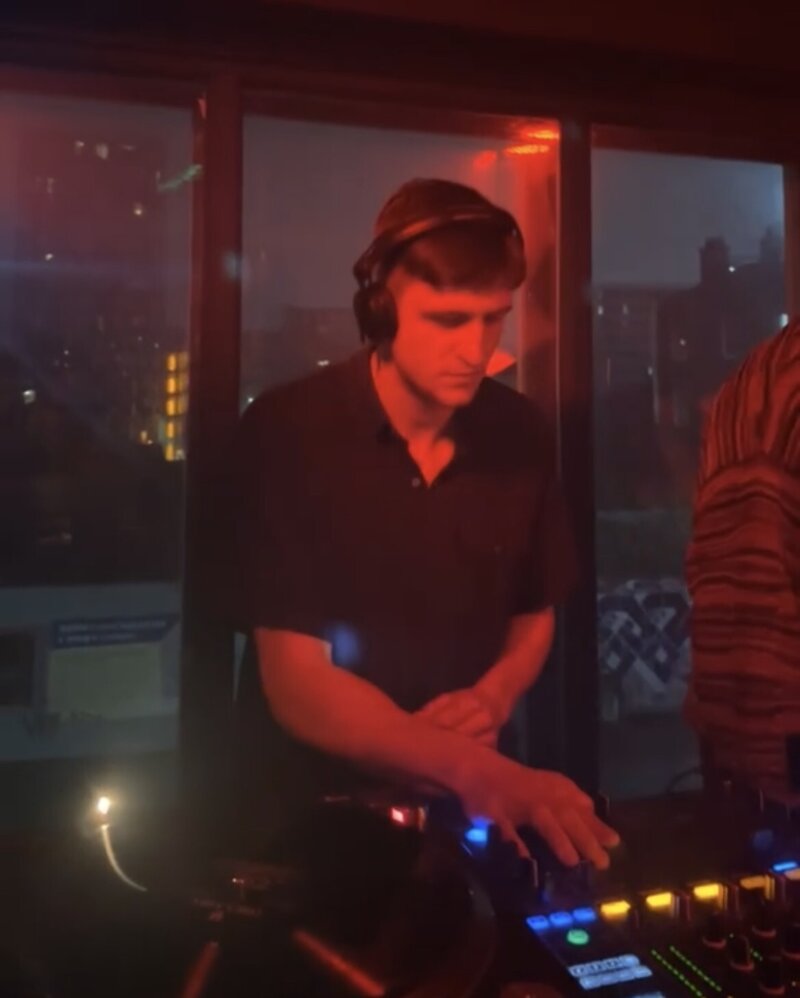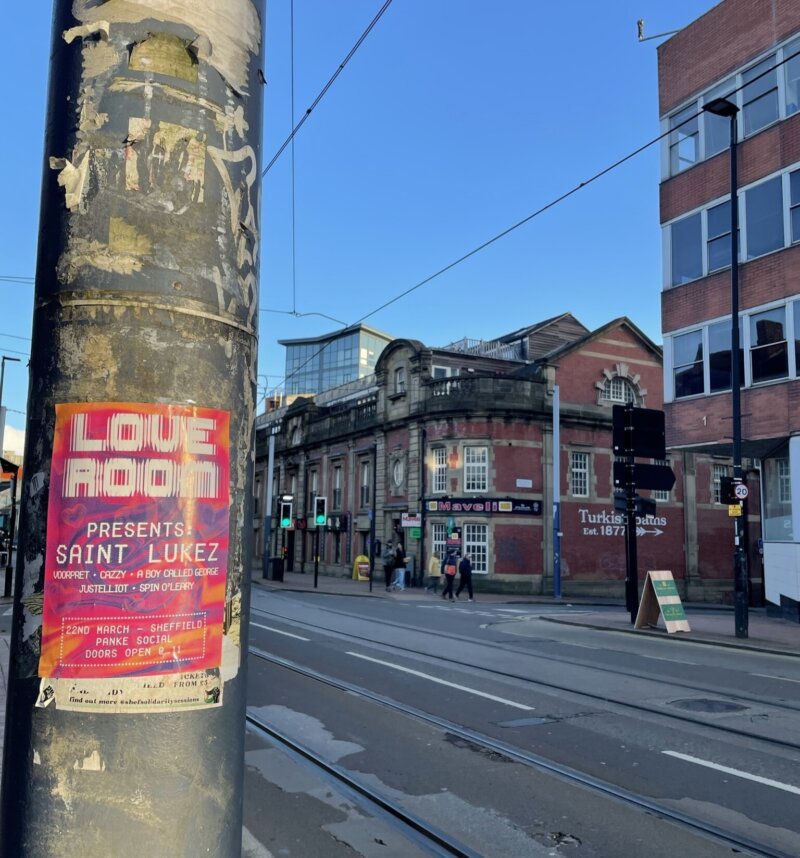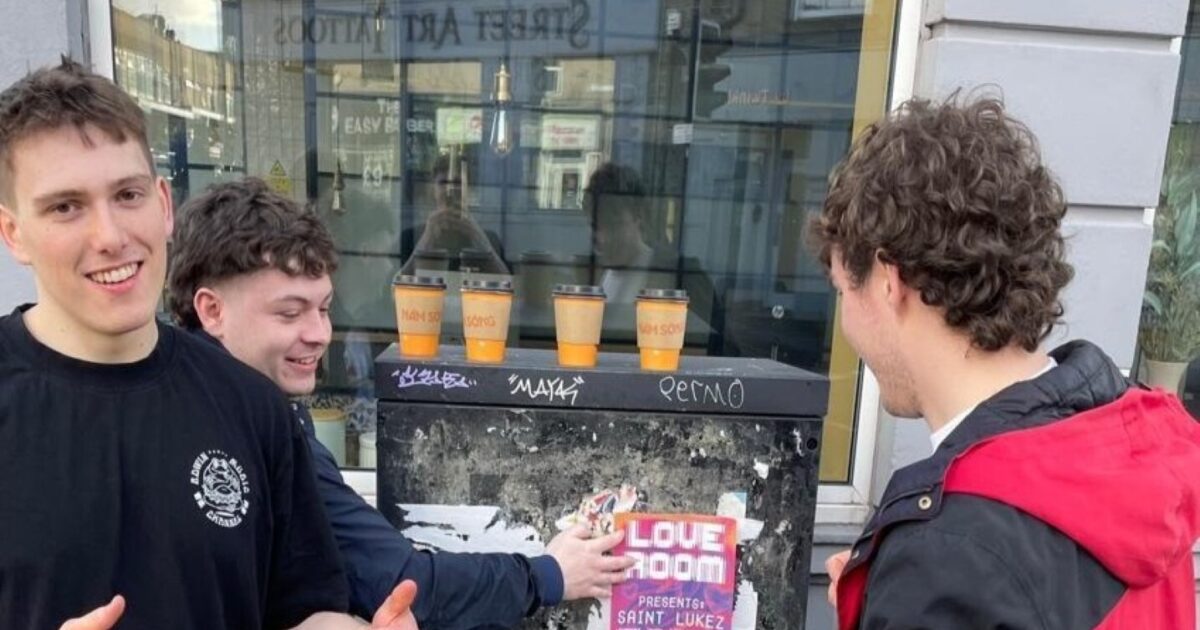It began as a joke or maybe just alcohol-fuelled hubris, stood in the smoking area of Hope Works or Hallamshire House, declaring we should host our own night. We knew exactly the vision. An event based on inclusivity and intimacy with a proper sound. A place where underground music could seek refuge in a city running out of space. A place we could develop and protect. We laughed and drank, but we thought.
Months went by as did our lives. Work, the pub, the club, girlfriends and football. A university degree, summer in Essex. Nothing. Autumn and the new year. Still nothing. Well not nothing: so many clubs had closed.
Finally, we let go of whatever was holding us back. It might have been a fear of failure. Or embarrassment. Or financial stress. Finally, whatever it was, we decided and jumped in: a vinyl-focused club night with eclectic music was born.

In the mix with A Boy Called George at Love Room’s debut event.
Me and my close friend, DJ and co-founder Gerard decided to name our night Love Room more than a year ago. While DJing in Sheffield during my undergrad degree, traversing Crookesmoor’s student house parties and holding a short-lived residency for House for the Heart, I learned about my ‘sound’ and approach. I remember DJing at Plot22 and thinking about how selecting music on the fly led to a more exciting performance. It created memorable moments which can’t be replicated by playing a setlist prepared alone in your bedroom on a Monday night.
DJing in small venues like Plot22 and Sidney & Matilda, I grasped how, if done right, intimate nights were much more memorable than big, impersonal warehouses. My first night DJing at Sidney & Matilda was special because of the music and the people. Likewise, going to Hope Works and listening to music and chatting to people had a profound effect on my view of dance music. I did this for a few years and somewhere during that time something clicked. Eventually I realised this was for me and part of me.
With that lived experience, these ideas have been etched into the ethos of our night for the purpose of making dancers feel welcomed and relaxed. We want a crowd who are friendly and open, just like the strangers who grace Sheffield’s dancefloors.
I owe a lot to the scene’s community. I remember speaking to Chris Duckenfield for one of my university projects who said how increasingly people want to blend in, not stand out. He said for the scene to keep beating there needs to be a community focus with groups experimenting and taking risks. But of course, this is challenging.
It’s hard because we live in the era of the superclub. Centred around some sort of moth-eaten ‘tech house’ sound, it demeans small grassroots venues. Born out of homogenised culture, with hyper-clicks and flashes, they kill independence through corporatism. But these smaller places are the heart of the culture. Whether it was hearing Luke Una tear up Bal Fashions or Chaos in the CBD all night at Wire, I knew these places brought so much joy. These feelings intensified with the closure of Hope Works, and I felt a responsibility to protect the scene. I don’t want Sheffield to become a smaller Manchester, with £8 pints and £50 tickets.
Out of this chaos, Love Room aims to create those nights in small venues with music that stands out and says something.
For these reasons I knew Sheffield was perfect as its home. Sheffield’s always had a strong commitment to DIY parties with a focus on community and intimacy. Some, like Gatecrasher and Apricot Ballroom, have gained notoriety but still identify with the underground. Hope Works focused on experimentation and community while bringing international DJs to the city. Others, like Mixxed and Simpler Times, exemplify these values today. Love Room aims to do the same and wants to progress Sheffield’s tradition of small venues and a love for all things underground.

It’s not all plain sailing. Local institution Hope Works closed last year, and numerous parties such as Pretty Pretty Good and As Is have come and gone. Rising rents, gentrification and lower levels of student drinking all squeeze profit margins for venues and the parties themselves. Love Room has faced challenges that embody the era we are in – margins are slim and stress is ubiquitous. Building something from the ground up is really hard and without friends in Sheffield helping out, our first two nights would not have been possible.
In times like these it’s easy to complain and give up. Maybe apathy was a comfort blanket and an excuse for our inaction. But making a stand feels important, and creating a space where like-minded people can come together is always worth the stress. It’s more important than big profits. Because watching friends and strangers dance to Chris Duckenfield’s whizzy basslines makes it worth it. Hearing Saint Lukez blast a 1990s deep house dub makes it worth it. Watching local DJs like Jodie-Tyler and Hethers makes it worth it. Seeing people smile makes it worth it.
So Love Room will keep going. It’s an uphill battle that will continue to be tough. But our scene is worth saving and we hope to be part of the talented Sheffield community in the future, and for the future.
